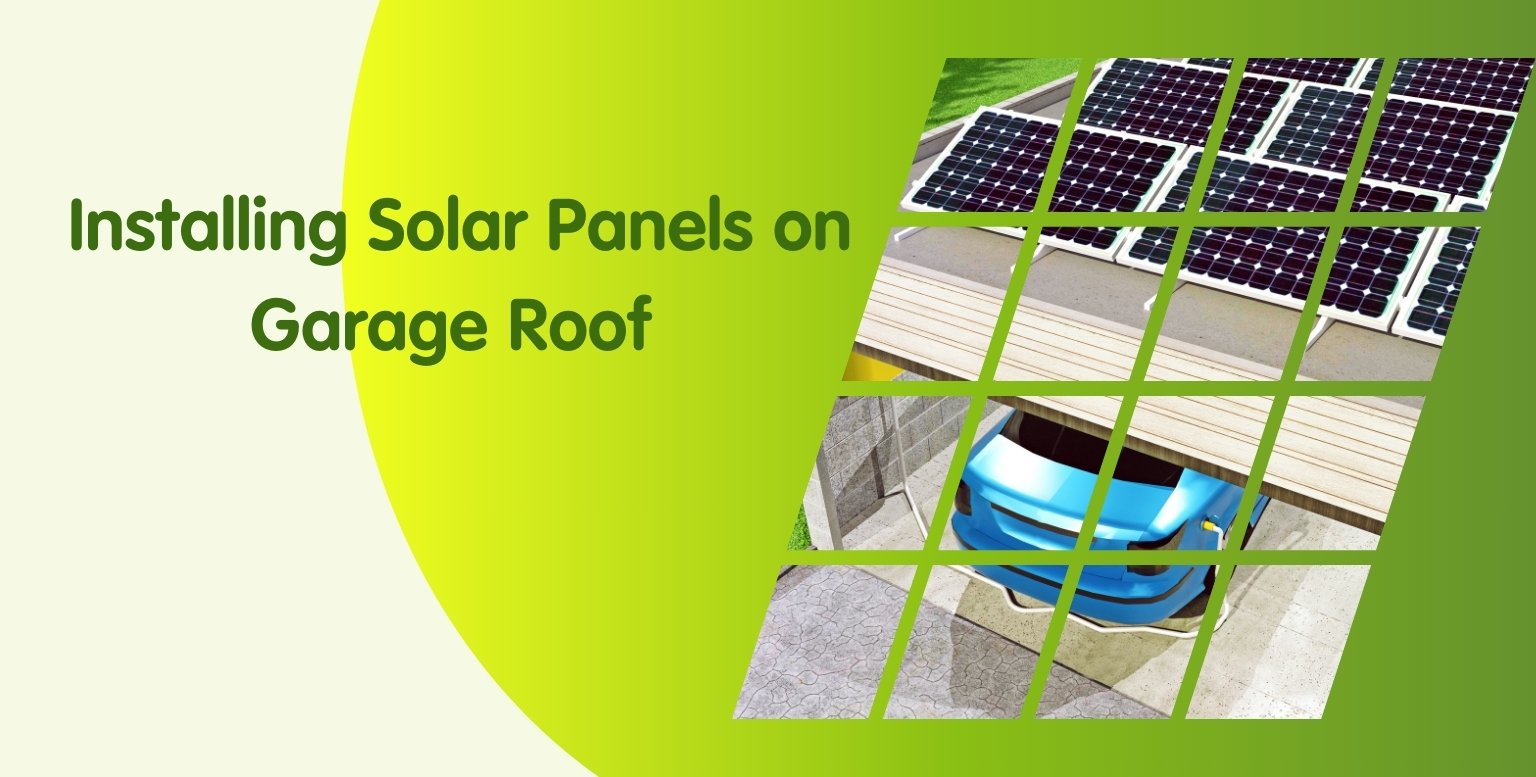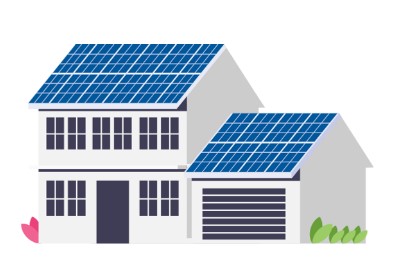Your basket is currently empty!
Written by
Solar Panels on Garage Roof Installation & Costs

Can you install solar panels on garage roof? Yes, and this guide will help you understand the process.
We’ll discuss roof suitability, benefits, costs, and maintenance of solar panels on garage roof installations.
Key Takeaways
- You can install solar panels on most garage roofs, but it’s essential to evaluate structural integrity, orientation, and shading before proceeding.
- While installing solar panels can lead to significant savings and energy independence, upfront costs and maintenance can be challenging.
- Installation costs for garage solar panels typically range from £3,000 to £6,000, with potential payback periods of 7 to 10 years depending on energy savings.
Can You Install Solar Panels on a Garage Roof?

The short answer is yes, you can install solar panels on a garage roof.
Most garage roofs, whether attached or detached, can support solar panels safely.
However, there are several factors to consider before jumping into the installation process.
Evaluating the roof’s integrity, angle, orientation, and distance from the house is necessary for a successful solar installation.
Professionals can offer valuable insights and help avoid potential pitfalls.
Assessing Your Garage Roof’s Suitability
Determining whether your garage roof is suitable for solar panels involves several key considerations.
Firstly, the average garage can typically accommodate four to six solar panels, but the roof must be large enough to support this number adequately.
The ideal orientation for solar panels is south-facing, as this allows for maximum sunlight exposure, though east and west orientations are also acceptable.
Shading is another critical factor.
Nearby trees and structures can significantly reduce the efficiency of your solar panels, so assess your roof for potential shading issues.
Additionally, consider the structural soundness of your garage roof, the distance to the main property, and any planning permission requirements.
Structural Integrity of Garage Roofs
The structural integrity of your garage roof is paramount when considering solar panel installation.
Most garage roofs can support the weight of standard solar panels, which typically weigh between 18 kg and 20 kg.
However, ensure that your roof can handle this additional weight without compromising its structural strength.
Key structural factors include the roof’s ability to withstand wind uplift and endure snow loads.
If you’re unsure about the structural integrity of your roof, consulting a professional structural engineer is highly recommended.
This step can prevent potential issues and ensure a safe and effective solar panel installation.
Benefits and Drawbacks of Garage Roof Solar Panels

Installing solar panels on your garage roof comes with its own set of benefits and drawbacks.
On one hand, it can significantly increase your green energy production and lead to substantial financial savings.
On the other hand, there are costs and maintenance challenges to consider when you put solar panels or add solar panels.
Exploring these aspects further can provide a better understanding.
Advantages of Installing Solar Panels on Garage Roofs
One of the primary advantages of installing solar panels on your garage roof is the potential for significant annual savings.
For instance, you could save around £127.50 annually, which can add up over time.
Additionally, solar panels provide homeowners with energy independence, reducing reliance on utility companies and allowing for the potential to power electric vehicles.
Garage roofs often have abundant garage roof space, permitting the installation of multiple solar panels.
A detached garage roof benefits from improved sunlight exposure and less shading, maximizing solar panel efficiency.
Maintenance tasks for solar panels on garage roofs are generally simpler and safer due to their accessibility.
Disadvantages of Installing Solar Panels on Garage Roofs
While the benefits are compelling, there are also notable drawbacks to installing solar panels on a garage roof.
The initial costs required for solar panel installation can be quite high, ranging from £3,000 to £4,000 for a typical setup.
This upfront investment can be a barrier for many homeowners.
Maintaining solar panels can also be challenging.
Regular checks and upkeep are needed to ensure optimal performance, as inefficiencies may arise from shading or the garage roof’s angle.
Weighing these factors against the benefits helps in making an informed decision.
Cost of Installing Solar Panels on a Garage Roof

Understanding the costs of installing solar panels on a garage roof is crucial for homeowners considering this investment.
The typical garage roof cost for installation can range from £3,000 to £4,000, but this can vary based on several factors including the size of the system, the quality of the panels, and the complexity of the installation.
Let’s break down these costs in more detail.
Average Installation Costs
The estimated cost range for installing solar panels on a typical garage roof is between £3,000 to £4,000.
However, the average cost range for garage solar panel installations in the UK is approximately £3,500 to £6,000.
For smaller installations with three panels, the cost can average around £2,108. Larger installations with six panels typically cost about £4,216.
These costs can vary based on the number of panels and the complexity of the installation.
For example, the initial cost for installing three panels is around £2,108, while a six-panel setup can cost about £4,216.
Consider your energy needs and available roof space when estimating the costs.
Financial Incentives and Payback Period
Many solar panel systems on garages can expect to pay back the investment within a period of 7 to 10 years.
In cases of more complex solar panel installations, the payback period may extend beyond 9 years.
The payback period is the time it takes for investors to recover the costs of solar panel installation through savings on energy bills.
Knowing the financial incentives and potential savings is important for making an informed decision.
By reducing your energy bills and potentially earning through Solar Renewable Energy Credits, the investment in solar panels can be worthwhile in the long run.
How Much Electricity Can Garage Roof Solar Panels Generate?
The potential electricity generation from garage roof solar panels is a critical factor to consider.
On average, solar panels on a garage roof can generate approximately 1,060 to 1,590 kWh annually.
This output depends on various factors such as the number of panels, roof alignment, and their performance levels.
Here’s how to calculate the potential energy output.
Calculating Potential Energy Output
Calculating the potential energy output from garage roof solar panels involves several considerations.
Shading from nearby structures or trees can significantly impact the efficiency of the solar panels.
While you can easily install solar panels on flat roofs, adding them to flat garage roofs may accommodate fewer solar panels compared to pitched roofs, limiting energy generation capacity.
To estimate energy generation, consider the wattage of the solar panels, typically between 250 and 400 watts.
The efficiency of solar panels is generally around 85%, indicating the proportion of sunlight converted into usable energy.
Daily monitoring of solar panel performance can help identify problems early and ensure maximum efficiency.
Connecting Garage Solar Panels to Your Property
Connecting garage solar panels to your property is a crucial step in the installation process.
Garage roof solar panels connect to your property through an inverter, similar to house roof panels, which ties into the fuse box.
This connection allows the electricity generated by the solar panels to be used to power your home.
Understanding the details of inverters and electrical connections is important.
Inverters and Electrical Connections
Inverters play a vital role in converting DC electricity from solar panels into AC electricity suitable for home use.
String inverters are commonly used in homes, connecting multiple panels to a single inverter for efficiency.
The inverter is often placed in the garage or a nearby utility space, facilitating energy conversion.
The connection involves running wiring from the solar panels to an inverter, which converts DC to AC for household use.
Proper wiring ensures safety and efficiency, and a registered electrician should handle the installation.
Managing Excess Energy
Managing excess energy generated by garage roof solar panels is crucial for maximizing savings.
Excess electricity can be sent back to the grid via net metering, allowing you to earn credits on your energy bills.
Attaching a solar system to the grid allows for charging batteries at night and selling excess power during peak times.
Battery storage systems enable the utilization of excess energy, permitting usage during off-peak times.
Battery storage integration allows energy use at any time, even during power outages. A battery in a solar panel system provides the flexibility to use power anytime.
Do You Need Planning Permission for Garage Roof Solar Panels?
Planning permission is often a concern for homeowners considering solar panel installations.
Fortunately, the installation of solar panels on garage roofs doesn’t typically require planning permission under permitted development rules.
However, listed properties or those in conservation areas may require permission.
Regulations and Exemptions
Homeowners should check with local planners to confirm any specific regulations before installing solar panels.
Most garages can be fitted with solar panels under permitted development, but ensure compliance with local planning authority conditions.
This step can prevent any legal issues and ensure a smooth installation process.
Maintenance and Longevity of Garage Roof Solar Panels
Maintaining solar panels on your garage roof ensures their longevity and efficiency.
The good news is that maintenance is generally simpler because garage roofs are easier to reach. Additionally, installing house roof solar panels can further enhance energy efficiency.
Regular maintenance can significantly extend the lifespan of your solar panels, which typically last around 30 years with minimal upkeep.
Routine Maintenance Tips
Routine maintenance includes cleaning solar panels every five years to enhance efficiency, especially in coastal areas with salt accumulation.
It is advisable to have solar panels professionally serviced every 5 to 10 years to ensure optimal performance.
Regular checks for dirt buildup or loose mounts can prevent problems.
Keeping solar panels free of shade from branches enhances energy production.
Bird droppings or other debris can create hotspots on solar panels, potentially damaging them if not cleaned regularly.
Dealing with Common Issues
A sudden drop in energy output may indicate an issue that needs addressing immediately.
Daily performance monitoring of your solar panels can help identify and resolve problems promptly.
Regular maintenance and timely intervention can ensure the long-term efficiency and reliability of your solar panel system.
Using Garage Solar Panels for Different Applications
Solar panels on garage roofs offer a sustainable energy source for diverse applications, enhancing energy independence.
From powering garage lights and tools to charging electric vehicles, the electricity generated by solar panels can be put to various uses.
Here are some common applications.
Powering Garage Lights and Tools
Garage solar panels can be used for a variety of applications, including lights, tools, and electronic devices.
Solar power can effectively support lighting and devices in the garage, making it a versatile solution. A solar panel system can solely power a detached garage if configured appropriately.
Solar PV setups with battery storage are becoming more commonplace, especially as more EV charging systems are implemented.
Charging Electric Vehicles
Solar panels can indeed be used to charge an electric vehicle.
A challenge is that solar panels only work during daylight, and winter months may require backup grid power.
Overcharging an electric vehicle battery with solar panels is rare but can lead to thermal runaway.
Charging electric vehicles with garage solar panels is an innovative use of renewable energy.
Summary
Installing solar panels on a garage roof offers a wealth of benefits, from financial savings and energy independence to versatile applications like powering tools and charging electric vehicles.
While the initial costs and maintenance can be challenging, the long-term advantages often outweigh these drawbacks.
By assessing your garage roof’s suitability, understanding the costs, and planning for maintenance, you can make an informed decision that contributes to a greener future.
Ready to harness the power of the sun? Your garage roof might just be the perfect place to start your solar journey.
Frequently Asked Questions
Can you install solar panels on a garage roof?
Absolutely, you can install solar panels on a garage roof! Just make sure to check that your garage’s roof can support the weight and has the right structural integrity before diving in.
Do I need planning permission to install solar panels on my garage roof?
You usually don’t need planning permission for solar panels unless your property is listed or located in a conservation area. Always check your local regulations to be sure!
How much can I save annually by installing solar panels on my garage roof?
You can save about £127.50 annually by installing solar panels on your garage roof, depending on your energy usage and the size of the system. It’s a nice way to cut costs while going green!
What is the average cost of installing solar panels on a garage roof?
Installing solar panels on a garage roof usually costs between £3,000 and £4,000, based on the number of panels and the complexity of the installation. It’s a solid investment for energy savings and sustainability!
How long does it take to recoup the cost of solar panel installation?
You can typically expect to recoup the cost of solar panel installation in about 7 to 10 years, depending on your energy savings and any available financial incentives.
Written by
Start Your Solar PANEL Project Today
Buy 1 get 1 FREE Solar Panels With Installation!
Solar Finance Options & Price Match Too!
What is in this article?
- Key Takeaways
- Can You Install Solar Panels on a Garage Roof?
- Benefits and Drawbacks of Garage Roof Solar Panels
- Cost of Installing Solar Panels on a Garage Roof
- How Much Electricity Can Garage Roof Solar Panels Generate?
- Connecting Garage Solar Panels to Your Property
- Do You Need Planning Permission for Garage Roof Solar Panels?
- Maintenance and Longevity of Garage Roof Solar Panels
- Using Garage Solar Panels for Different Applications
- Summary
- Frequently Asked Questions





